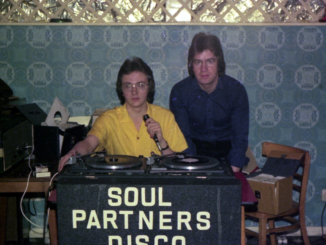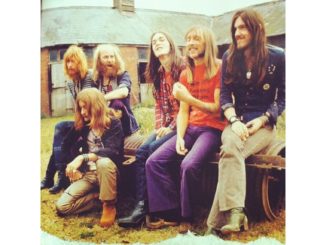Oh dear – It’s that time of year again…
Don your taffeta and sequinned best, pull on your bondage trousers, lube up your leather chaps and please be welcome to the annual festival of flounce and flamboyance that we all know and love as the Eurovision Song Contest.
It’s Grand Final Night, the music will be mostly awful (with perhaps the occasional gem) and the voting will probably be the most entertaining part of the evening. I still miss Sir Tel’s wonderfully dry commentary, but the present incumbent, who is generally irksome and annoying, is not that bad in this environment and is actually quite well suited to the show.
This year – surprise, surprise – our entry (Olly Alexander – Dizzy, above) is pretty dire, generic, auto-tuned to within an inch of its life and utterly perfect for Eurovision. It actually has a pretty decent 1980’s synth-pop vibe, but, as always, none of this really matters because political voting reigns supreme and we evil, nasty, small-minded Brexiteers will probably never again be allowed to triumph as top of the Euro-pops.
And as for “teh current thing wot we all supports”, we have of course now moved on from the Ukraine situation and, for this year’s festivities, Palestine is saveur du jour and our current cause célèbre.
Somewhat controversially, Israel is competing in this year’s ESC, despite calls for the country to be banned due to the ongoing shenanigans in Gaza. The EBU has defended its decision to permit Israel to take part and has firmly rejected comparisons to Russia (which was banned in 2022) because that was completely different, obvs…
Anyway, Eden Golan is representing Israel with the track “Hurricane”, which was heavily reworked from Israel’s original entry “October Rain”, because that version was alleged to include references to attacks on Israel by Hamas. This has not gone down well with the Lefterati and, subsequently, there have been protests in Malmo (this year’s host city), tantrums, hissy fits, tears before bedtime and many, many calls for boycotts. Inevitably, there were suggestions that Israel’s entry would be eliminated at the semi-finals stage, but this failed to materialise and Eden Golan easily made it through to tonight’s grand final – let battle commence!
A little bit of ESC History
The ESC began life as the brainchild of Marcel Bezençon of the EBU (European Broadcasting Union). The Contest was originally designed to test the limits of live broadcast technology, but these days it’s more about fun, flamboyance and a little bit of political posturing – and it’s apparently the most watched TV programme in Europe.
But why do non-European countries enter?
Being allowed to enter the contest isn’t about geography but about membership of the EBU; every country which is a member is eligible to take part. Since both Israel and Armenia are members of the EBU (despite being outside the continental borders) they are therefore eligible to take part in the contest. Israel have been EBU members since 1957, but didn’t take part in Eurovision until 1973. Armenia only joined in 2005, making their contest debut the following year.
EBU membership also allows the likes of Azerbaijan and Georgia, who are only partially in Europe, to take part in the contest. The clue is in the name. It’s the Euro-vision Song Contest, not the Euro-pean Song Contest!
Other countries such as Australia were invited along as ‘special guests’ for the 60th contest, based on the fact that they’re huge fans of Eurovision and it’s broadcast down under every year.
A few details and Euro-facts
ABBA hold the title for the most successful Eurovision Song Contest winner. The Swedish pop band won the 1974 contest (held, appropriately, in Brighton) and have enjoyed phenomenal success ever since – despite officially splitting up in 1983.
The most covered Eurovision Song Contest song is Domenico Modugno – Volare ( Nel Blu Dipinto Di Blu ) ( 1958 ) also known as Volare.
The first contest was held on May 24 1956, when seven nations participated. With a live orchestra (the norm in the early years) and simple sing-along songs broadcast on a selection of radio stations, the contest was a great success and quickly grew into a true pan-European tradition.
Following the break-up of the Soviet Union, more countries were keen to sign up. So in 1993 and 1994, (a then record) 25 countries took part. In 1996, a pre-qualification heat was organised to reduce 29 participants to 23, while host country, Norway, automatically qualified for the contest as the 24th country. The challenge of too many entries was solved in 2004, when a Semi-Final was introduced. Growing interest led to the introduction of a second Semi-Final in 2008. As a result, a record number of 43 countries took part in 2008 for the first time.
Ratings of the Eurovision Song Contest have varied greatly over the past decades. In 2016, some 204 million people saw at least one of the three shows in whole or in part.
Most successful countries
With seven victories, Ireland and Sweden are the most successful nations, while Luxembourg, France and the United Kingdom have each won five times.
The UK Winners:
- Sandie Shaw – Puppet on a String (1967)
- Lulu – Boom Bang-a-Bang (1969 tied)
- Brotherhood of Man – Save Your Kisses for Me (1976)
- Bucks Fizz with Making Your Mind Up (1981)
- Katrina and the Waves – Love, Shine a Light (1997)
It is worthy of note that the UK have also finished as runner-up on a record 16 occasions; with Pearl Carr & Teddy Johnson (1959), Bryan Johnson (1960), The Allisons (1961), Matt Monro (1964), Kathy Kirby (1965), Cliff Richard (1968), Mary Hopkin (1970), The New Seekers (1972), The Shadows (1975), Lynsey de Paul and Mike Moran (1977), Scott Fitzgerald (1988), Live Report (1989), Michael Ball (1992), Sonia (1993) and Imaani (1998). The United Kingdom finished outside the top ten on only three occasions at the contest in the 20th century (1978, 1987 and 1999). Some top tunes amongst that lot.
In the 21st century, the United Kingdom has only reached the top ten on three occasions, with Jessica Garlick third (2002), Jade Ewen fifth (2009) and Sam Ryder second (2022). Since 2003, the UK have finished outside the top 20 on 10 occasions, including Jemini’s appallingly bad 2003 “nul points” result, which was the first time that our country had come last in the contest. The UK also finished last in 2008 with Andy Abraham (14 points) and in 2010 with Josh Dubovie (10 points). My personal view is that we had some pretty awful songs and singers.
Nul-point Norway can be found at the bottom of the scoreboard as many as eleven times. The songs came last in 1963, 1969, 1974, 1976, 1978, 1981, 1990, 1997, 2001, 2004 and in the Grand Final of 2012. In fairness, they also won three times, in 1985, 1995 and 2009.
In 1969, four countries topped the scoreboard with an equal amount of points; the United Kingdom, Spain, the Netherlands and France. Lacking rules to resolve tie situations, the EBU had to declare all four contestants as winner. Tie breaks were introduced after this.
Until 1998, each act was supported by a live orchestra and every country brought their own conductor. Noel Kelehan conducted the orchestra of five winners, in 1980, 1987, 1992, 1993 and 1996. Dutch conductor Dolf van der Linde conducting for a record seven countries; Belgium, Germany, Ireland, Luxembourg, the Netherlands, Sweden and Switzerland.
Mind your language
In the beginning, it was obvious for the participants that they should sing in their country’s national language. However, as the Swedish entry in 1965, Absent Friend, was sung in English, the EBU set very strict rules on the language in which the songs could be performed. National languages had to be used in all lyrics. Song writers across Europe soon tagged onto the notion that success would only come if the judges could understand the content, resulting in such entries as Boom-Bang-A-Bang and La La La. In 1973, the rules on language use were relaxed, and in the following year ABBA would win with Waterloo. Those freedom of language rules would be soon reversed in 1977, to return with apparent permanent status in the 1999 contest.
Money talks
In 1999, a rule change allowed the United Kingdom, along with France, Germany and Spain, to automatically qualify for the Eurovision Song Contest final (irrespective of their recent performances), due to these four being the biggest financial contributors to the EBU.
Voting
The voting systems used in the contest have changed throughout the years. The modern system has been in place since 1975. Voters award a set of points (from 1 to 8, then 10 and finally 12) to songs from other countries — with the favourite being awarded the famous *Douze Points*. Historically, a country’s set of votes was decided by an internal jury, but in 1997 five countries experimented with tele-voting, giving members of the public in those countries the opportunity to vote en-masse for their favourite songs. The experiment was a success and from 1998 all countries were encouraged to use tele-voting wherever possible.
Regional bloc voting (h/t Wiki)
Although statistical analysis of the results from 2001 to 2005 suggests regional bloc voting; it is debatable whether this is due to political alliances or a tendency for culturally close countries to have similar musical tastes. The United Kingdom and France would historically exchange points (an average of 6.5 points per contest), and the UK has also had such a relationship with Ireland. Several countries can be categorised as voting blocs, which regularly award each other high points:
- Greece, Cyprus and Bulgaria
- Turkey and Azerbaijan
- English-speaking countries or countries of the Commonwealth: Australia, Malta, Ireland and United Kingdom
- Austria, Germany and Switzerland
- The Netherlands and Belgium
- Andorra, Portugal and Spain
- Albania and Italy
- The Nordic states: Sweden, Norway, Finland, Denmark, and Iceland
- The Baltic states: Estonia, Latvia, and Lithuania
- Romania and Moldova, acting as a bridge between the Balkan and Warsaw Pact states
- The Balkan countries:
- North Macedonia and Albania
- The former Yugoslav countries: Serbia, Bosnia and Herzegovina, Slovenia, Montenegro, North Macedonia, and Croatia
- The former USSR countries of Belarus, Ukraine, Russia, Azerbaijan, Armenia, Georgia and Moldova
- Hungary and Serbia
It is still common for countries to award points to their neighbours regularly, even if they are not part of a voting bloc (for example, Finland and Estonia, Germany and Denmark, the Baltic states and Russia or Albania and Greece). Votes may also be based on a diaspora. Greece, Turkey, Poland, Russia and the former Yugoslav countries normally get high scores from Germany or the United Kingdom, Armenia gets votes from France and Belgium, Poland from Ireland, Romania from Spain and Italy and Albania from Switzerland, Italy and San Marino.
Will any of these shenanigans impact tonight’s results? We shall soon see…
Featured image: Zeljko Joksimovic, CC BY 2.0, via Wikimedia Commons
© Phil the ex-test manager 2022 2024.
Lightly updated for 2024 by Ivory Cutlery



